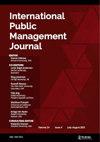Whom do we learn from? The impact of global networks and political regime types on e-government development
IF 3
3区 管理学
Q2 PUBLIC ADMINISTRATION
引用次数: 1
Abstract
Abstract This study investigates the impact of global networks on e-government development and the role of political regime types in e-government diffusion through international networks. We built a unique social network dataset that covers 148 countries for the years between 2003 and 2014. Our network dataset is rooted in two assumptions: 1) international organizations serve as peak organizations for international policy networks, 2) public managers who participate in international e-government conferences held by the UN and OECD work as boundary spanners. Our empirical evidence suggests that countries well embedded in global e-government networks receive ideas for public sector innovation from international conferences and show a high level of e-government development. However, political regime types serve as implicit and explicit filters of ideas for boundary-spanning activities. Ties between countries with the same political regime improve e-participation and ties between autocracies have a positive impact on online service delivery. However, ties between countries with different political regimes have no impact on e-participation and a negative influence on online service delivery. Thus, we debunk the democratic advantage perspective by demonstrating that democracies and autocracies have different ideas of and purposes for e-government.我们向谁学习?全球网络和政体类型对电子政务发展的影响
摘要本研究调查了全球网络对电子政务发展的影响,以及政治制度类型在电子政务通过国际网络传播中的作用。我们建立了一个独特的社交网络数据集,涵盖了2003年至2014年间的148个国家。我们的网络数据集基于两个假设:1)国际组织是国际政策网络的高峰组织,2)参加联合国和经合组织举行的国际电子政务会议的公共管理人员是边界管理人员。我们的经验证据表明,融入全球电子政务网络的国家从国际会议中获得了公共部门创新的想法,并显示出电子政务的高水平发展。然而,政治制度类型是跨越边界活动的思想的隐性和显性过滤器。同一政治政权的国家之间的关系改善了电子参与,独裁政权之间的关系对在线服务的提供产生了积极影响。然而,不同政治制度的国家之间的关系对电子参与没有影响,对在线服务的提供有负面影响。因此,我们通过证明民主国家和独裁国家对电子政务有不同的想法和目的来揭穿民主优势的观点。
本文章由计算机程序翻译,如有差异,请以英文原文为准。
求助全文
约1分钟内获得全文
求助全文
来源期刊

International Public Management Journal
PUBLIC ADMINISTRATION-
CiteScore
5.30
自引率
11.50%
发文量
49
期刊介绍:
The International Public Management Journal (IPMJ) publishes high-quality empirical and theoretical work on managing large organizations, particularly public organizations. IPMJ features work from scholars around the world who conduct research in the areas of public management and government reform, comparative public administration, organizational theory, and organizational behavior. IPMJ seeks to provide a bridge between those conducting research on public management and public administration on the one hand, and those working in the areas of organizational behavior and organization theory on the other. IPMJ intends to stimulate and reflect the academic interests of an international constituency of readers and scholars.
 求助内容:
求助内容: 应助结果提醒方式:
应助结果提醒方式:


